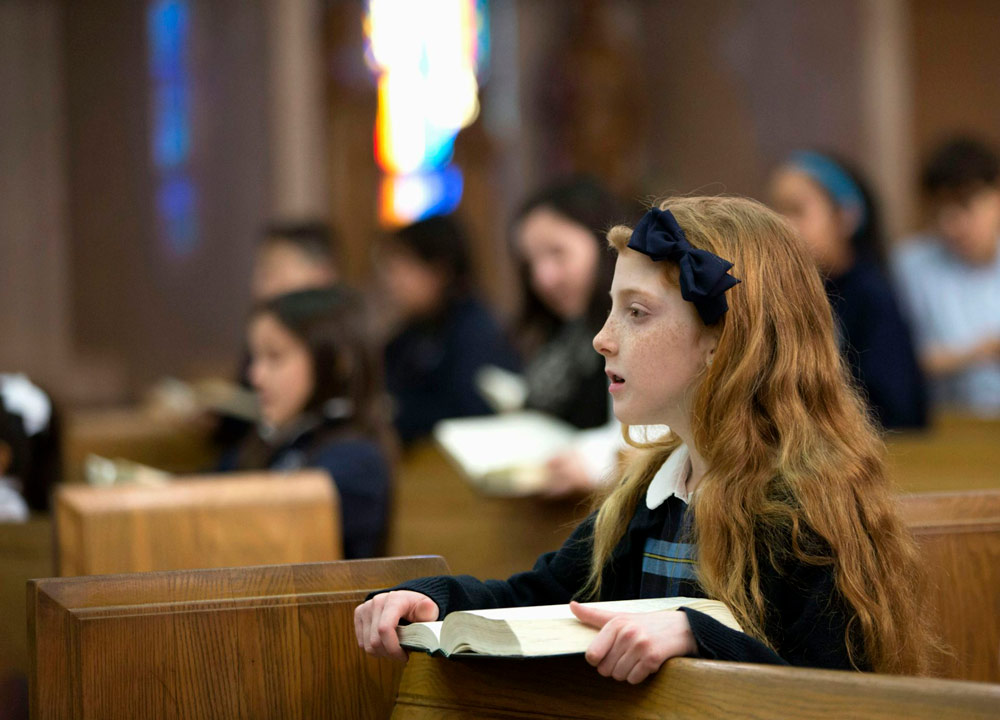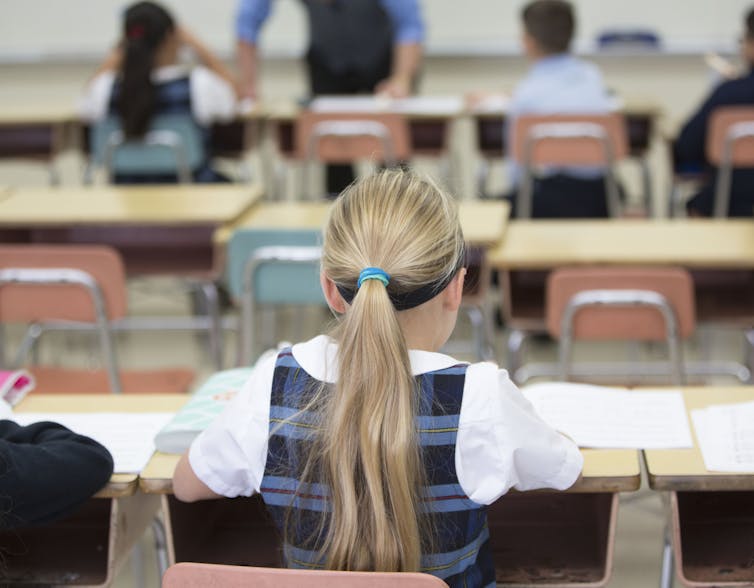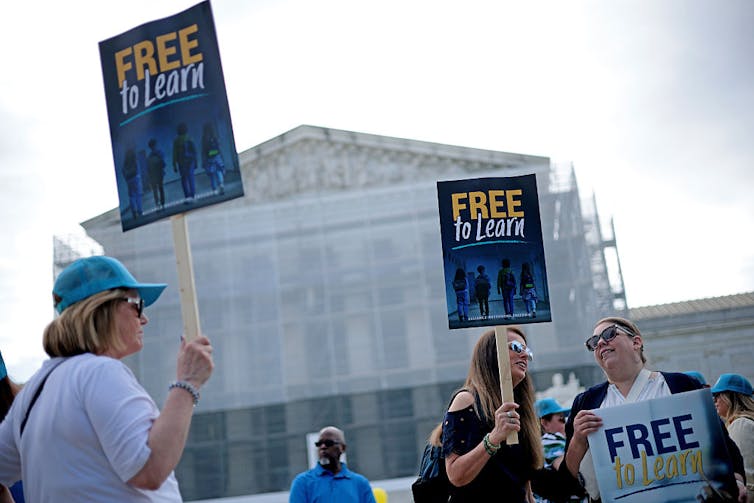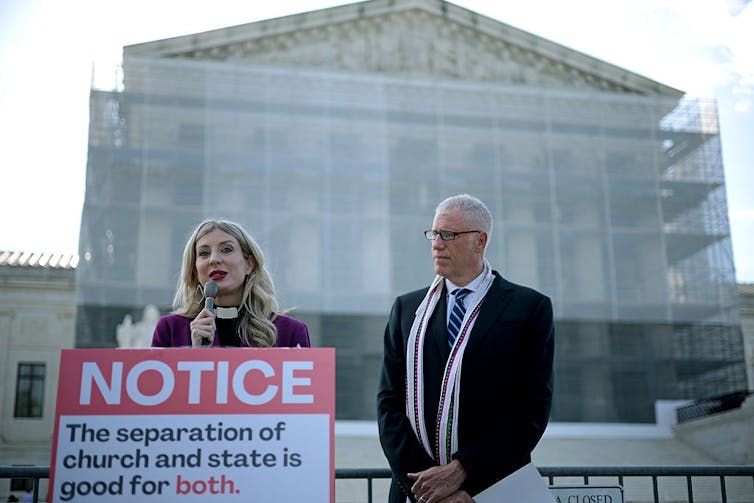
By Derek W. Black
The U.S. Supreme Court heard oral arguments on April 30, 2025, in what could be the most consequential case for public education since the court started requiring schools to desegregate in the years following Brown v. Board of Education.
St. Isidore of Seville Catholic Virtual School v. Drummond – and its companion case, Oklahoma Statewide Charter School Board v. Drummond – asks whether religious groups have a right not just to start public charter schools with public tax dollars but to operate them as faith-based schools.
Over the past 70 years, the court has decided dozens of cases dealing with the everyday interaction between schools and their students, such as when a school can discipline a student or limit their free speech. But as a scholar of education law, I argue that St. Isidore presents an entirely different kind of question – what it means to be a public school, and who gets to have one.
If the court allows churches to operate religious charter schools, the public education system, as Americans know it, will take on an entirely new face and set of financial challenges.
Seizing an opportunity?
The most ardent school choice advocates have been waiting for the opportunity to reshape the education landscape since schools integrated and state-sponsored prayers ended.
When the Supreme Court ordered school desegregation in 1954, Virginia and other states adopted private school vouchers as a solution for those families who did not want to attend integrated school. Virginia authorized public schools to close and began using public dollars to pay students’ tuition in private segregation academies.
The Supreme Court, however, declared that scheme unconstitutional.
Similarly, after several court decisions limiting school-led prayers, religious and political leaders pushed for private school vouchers in the 1990s for those parents who wanted religion to play a larger role in their children’s education.
The Supreme Court found this newer vintage of vouchers constitutional so long as the funds arrived at religious school solely as a result of the private choices of families rather than the government.
State lawmakers and constitutions, however, continued to limit the scope of vouchers until 2020, when the court held that states that chose to operate voucher programs could not prohibit students from using them at religious schools in Espinoza v. Montana Department of Revenue.

Jonathan Kirn/The Image Bank via Getty Images
Many school choice advocates now argue that public schooling itself – at least in its current form – violates parents’ rights to freely choose where their children attend school.
As legal scholar Philip Hamburger argued in the Wall Street Journal in 2021, “When government makes education compulsory and offers it free of charge, it crowds out parental freedom in educational speech.”
Many dissenting parents either want their tax dollars back or for states to give religious institutions an equal share of the public education pie.

Alex Wong/Getty Images News
The St. Isidore plaintiffs argue that they have a right to start charter schools with public money, the same as anyone else, and teach whatever they want.
Charter schools are public schools
The fact that states enlist private actors to operate charter schools has always been an enormous source of political controversy in its own right.
Defenders of the traditional public school system, for instance, argue that the current system of running charter schools, which are publicly funded but privately operated, siphons money from traditional public schools and allows private actors to extract profits at the expense of students.
Charters surely look different than traditional public schools, but states still carefully structure charters as public schools in important ways.
Charter schools operate within states’ public education systems and discharge states’ constitutional duty to maintain a system of public schools that prepares students for civic life.
All those schools, per state statutes, deliver instruction based on shared democratic and civic values – not ones that favor any religion over another.
Private schools, public funding
If religious charter schools expand nationwide, faith-based schools struggling to keep their doors open could apply to become charters. If approved, this would further strain public school budgets.
Many Catholic schools, for instance, are looking for a fiscal lifeline. They saw their biggest decline in student enrollment in 50 years in 2021, which forced many to close.
If the U.S. Supreme Court opens the door to these and other religious schools becoming charters, the current charter school population – 3.7 million students in 7,800 charter schools – could dramatically expand.
This could force states to increase taxes to cover the new cost of expansion or further divide already insufficient public education funding – at least that’s what happened a decade ago when states eliminated caps on the number of charter schools they would authorize.

Alex Wong/Getty Images
Between 2008 and 2018, the amount of funding available per pupil in traditional public schools substantially declined, while funding for charters schools increased, leaving public schools to try to maintain the same services but with fewer resources.
Unlike private school vouchers, which states can limit in various ways, charter school funding is integrated into the statutory framework of financing public education. Charter schools are entitled to public funding for every student they enroll and receive roughly the same amount of state and federal dollars as every other public school.
In some states, charters also get a proportional share of the property taxes that local school districts raise.
Future at stake
Five years ago, state and federal constitutions blocked states from directly funding religious schools, in keeping with the First Amendment’s prohibition of government “establishing” religion.
But in 2020, in Espinoza v. Montana, the Supreme Court held that singling out religious schools for exclusion from the state’s general private school voucher program denied students their right to the free exercise of religion.
Nothing in the court’s opinion, however, required states to create voucher programs, much less implied that reserving public education funds for public schools was illegitimate.
If we take the court at its word in the Montana case – that a “State need not subsidize private education” – the St. Isidore case should be simple.
But if the Supreme Court opens the door to religious charter schools, I argue it will redefine the meaning of public education.
![]()
Derek W. Black is Professor of Law at the University of South Carolina.





























Deborah Coffey says
Yep. This has been the Republican plan for decades…get rid of all public education…privatize EVERYTHING, including Social Security. Hey, voting Republicans, maybe you can’t hate government and then expect good things from government. Come on over to the center left and let’s make a country that is OF, BY and FOR the people. We won’t ever agree on everything, but we can make sure we get the important things done that we do agree on.
Jim says
Based on the direction the Supreme Court has taken in recent years, this will probably get accepted.
This is what I do not understand:
* Every parent has the right to put their child in private school or home school if for whatever reason they do not want their kid attending public school.
* Every (almost) citizen pays taxes which support the public school system. I pay these taxes and my kids have been out of school for 20+ years and went in a different state. Yet I pay those taxes that I (allegedly) don’t get any benefit. I have no problem with that. I also pay taxes for city services that I seldom receive yet I understand those services are necessary for the community. I pay taxes for roads to be paved (sometimes) that I’ll most likely never travel. I pay for the gas in city vehicles that I see idling by the road at worksites and such. I don’t like that but I haven’t attempted to seek compensation for such things. I pay taxes to support the fire and police departments yet I haven’t needed either in years. But I recognize the community need.
* Public schools are meant for the community and for the children to receive a basic education to prepare them for life. All of us can reasonable question what exactly is taught and what isn’t. I don’t expect the school system to be perfect but I expect them to do absolutely the best they can for each child in the system. And because education is an absolute must for all children (and would help a lot of adults), I’m fine with paying my share of taxes to support public schools.
* Public schools should not be teaching religion of any type. No matter what religion a child or family in the system is, the concentration should be on basic education. Religious training is up to the parents.
* Public schools should not discriminate. Pick your favorite boogeyman for that one. I do not understand any parent getting upset about the possibility that some kid in their school or classroom fits into another category other than their child. Last time I checked, that’s the way it is in this world and part of education should be learning to treat everyone the same/equally. You don’t have to like it but it’s not contagious so just chill out.
* Churches and other private schools are fine and have a place in the community. But not at the cost to public schools. They are an alternative and if you want to send your child there – for whatever reason – that’s your right – just don’t ask the rest of us to help fund that. Just like owning a Mercedes vs. a Kia, if you’ve got the money or that much desire, have at it.
If would be a much better world if more people would accept that nothing is ever perfect and often it isn’t the way we think it should be. You work to change those things – within the system. It may never change but you have the right to try. In the meantime, let’s not ruin the public school system because of those who think they should have the final say on everything. It doesn’t happen in the real world.